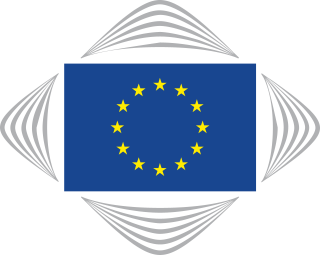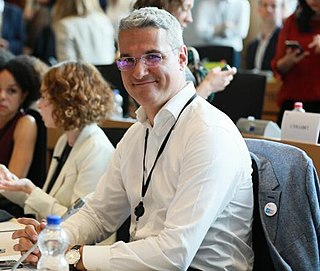
The European Committee of the Regions (CoR) is the European Union's (EU) assembly of local and regional representatives that provides sub-national authorities with a direct voice within the EU's institutional framework.

The European Economic and Social Committee (EESC) is a consultative body of the European Union (EU) established in 1958. It is an advisory assembly composed of representatives from employers' associations, workers' unions and civil society organisations. Its seat, which it shares with the Committee of the Regions, is the Jacques Delors building on Belliardstraat / Rue Belliard 99 in Brussels.

The European People's Party (EPP) is a European political party with Christian democratic, liberal-conservative, and conservative member parties. A transnational organisation, it is composed of other political parties. Founded by primarily Christian-democratic parties in 1976, it has since broadened its membership to include liberal-conservative parties and parties with other centre-right political perspectives. On 31 May 2022, the party elected as its President Manfred Weber, who was also EPP's Spitzenkandidat in 2019.

The Secretariat of the European Parliament is the administrative body of the European Parliament headed by a Secretary-General. It is based in the Kirchberg district of Luxembourg City and around the Brussels-Luxembourg Station in Brussels and employs around 4,000 officials.

The Bolkestein directive or Services Directive, officially Services in the Internal Market Directive2006/123/EC, is a European Union law aiming at establishing a single market for services within the European Union (EU). Drafted under the leadership of the former right-wing European Commissioner for Internal Market Frits Bolkestein, it has been popularly referred to by his name. It was seen as an important kick-start to the Lisbon Agenda which, launched in 2000, was an agreed strategy to make the EU "the world's most dynamic and competitive economy" by 2010.

The European Union Institute for Security Studies (EUISS) is the EU’s think tank for foreign and security policy.

The European Structural and Investment Funds are financial tools governed by a common rulebook, set up to implement the regional policy of the European Union, as well as the structural policy pillars of the Common Agricultural Policy and the Common Fisheries Policy. They aim to reduce regional disparities in income, wealth and opportunities. Europe's poorer regions receive most of the support, but all European regions are eligible for funding under the policy's various funds and programmes. The current framework is set for a period of seven years, from 2021 to 2027.
The open method of coordination (OMC) is a relatively new intergovernmental means of governance in the European Union, based on the voluntary cooperation of its member states. The open method rests on soft law mechanisms such as guidelines and indicators, benchmarking and sharing of best practice. This means that there are no official sanctions for laggards. Rather, the method's effectiveness relies on a form of peer pressure and naming and shaming, as no member state wants to be seen as the worst in a given policy area.
The European Anti-Poverty Network (EAPN) is the largest European network of national, regional and local networks, involving anti-poverty non-governmental organisations (NGOs) and grass-root groups as well as European organisations, active in the fight against poverty and social exclusion. It was established in 1990.
European Union (EU) concepts, acronyms, and jargon are a terminology set that has developed as a form of shorthand, to quickly express a (formal) EU process, an (informal) institutional working practice, or an EU body, function or decision, and which is commonly understood among EU officials or external people who regularly deal with EU institutions.
EQUAL was a Community Initiative within the European Social Fund of the European Union. It concerned “transnational co-operation to promote new means of combating all forms of discrimination and inequalities in connection with the labour market”. It ran from 2001 till 2007 with a budget of some €3 billion of EU resources, matched by a similar sum from national resources.

The Center for Policy Studies (CPS) is an academic unit within Central European University, dedicated to improving the quality of governance in Central and Eastern Europe and the former Soviet Union by the provision of independent public policy analysis and advice.
Stephen Gaetz, is the director of the Canadian Observatory on Homelessness (COH) and a professor at the Faculty of Education at York University in Toronto, Ontario, Canada. Dr. Gaetz has enhanced pan-Canadian collaboration between stakeholders interested in homelessness research in Canada.
TARKI Social Research Institute is an independent research centre located in Budapest, Hungary. TARKI conducts applied socioeconomic research in social stratification, labour markets, income distribution, intergenerational transfers, tax-benefit systems, consumption and lifestyle patterns and attitudes in Hungary and, in the majority of its projects, in Europe. TARKI is closely embedded in international collaborations with major European academic partners in various research projects. Senior staff at TARKI all have PhDs with substantive and methodological interests and many hold professorial appointments at major universities. TARKI has its own fieldwork apparatus, capable of carrying out regular empirical surveys on social structure and on attitudes and of managing large scale international research. TARKI also carries out the Hungarian fieldwork of various high-quality international surveys.
The European Distance and E-Learning Network (EDEN), originally named the European Distance Education Network, was established in 1991. EDEN is an international educational association open to institutions and individuals dealing with e-learning, open education, and distance education. EDEN is a not-for-profit organisation, registered as a limited company under English law.
The Canadian Observatory on Homelessness (COH)—formerly named the Canadian Homelessness Research Network (CHRN)—is a Canadian non-profit, non-partisan research institute that works with researchers, service providers, policy makers, students and people who have experienced homelessness.
The European Union is committed to upholding Human Rights and sees this as a core and essential part of its role. As such the EU seeks to protect and defend these rights within member states and in interactions with non-members.
Austerity measures and the ongoing fiscal crisis have significantly spurred the rise in homelessness in Greece in the 21st century. Instances of homelessness have been dominantly concentrated in the city of Athens. Homelessness remains a relatively under-examined area of social policy in Greece, with the first organised counting for homeless people taking place in May 2018. Governments and non-profit organisations alike have made efforts to counter this phenomenon.

Homelessness services are specialized programs assisting homeless people. While homelessness services may be government-run or government funded, non-profit organizations often play an important role in service delivery. Services supporting homeless people may assist them to achieve positive change in their life and reduce the use of both homelessness services and of other welfare services. While these services are specifically geared toward homeless people, researchers note that the drivers and the responses to homelessness stretch beyond the scope of such services.

Dragoș Pîslaru is a Romanian economist and politician of REPER who has been serving as a Member of the European Parliament since 2019. He was previously a member of USR PLUS/USR. He also held the position of Minister of Labor, Family, Social Protection and the Elderly in the government of Prime Minister Dacian Cioloș from 18 April 2016, until 4 January 2017.








